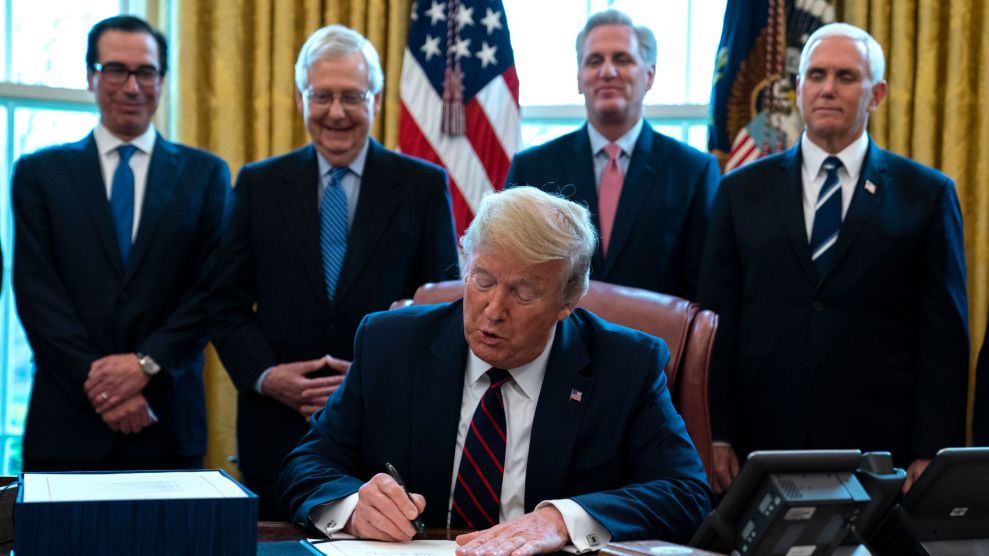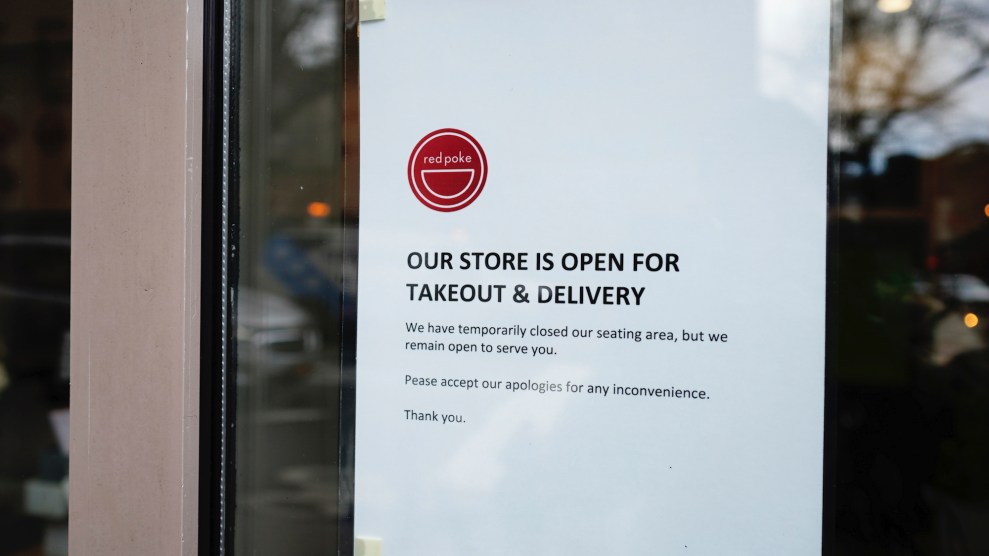
President Donald Trump signing a $2 trillion coronavirus relief billEvan Vucci/AP
You might think that McDonald’s is a giant corporation. You are right. But you are also wrong. Under two coronavirus relief bills passed by Congress in March, a corporation like McDonald’s might be eligible for benefits as both a large and a small business—at the same time.
How can this be? As the New York Times reported, a carveout for the restaurant and hotel industry made its way into the $2 trillion CARES Act. It would allow loans intended to keep small businesses afloat to instead go to individual restaurant or hotel locations that are part of major international brands:
The provision says that if a company owns multiple hotels, even if the overall hotel or restaurant chain has more than 500 employees—the limit to qualify for treatment as a small business—it will still be able to take advantage of the small-business benefits offered in the rescue package.
That means loans from the federal government worth up to 2.5 times the firm’s monthly payroll that will not have to be repaid if the company uses them to keep paying employees during any coronavirus shutdowns…
The large corporations that own the big brands—like Marriott or Hilton—would not be eligible. But any individual hotel, including from one of these brands, that has fewer than 500 employees would be. Many hotels are owned by franchisees.
This loophole also applies to restaurant chains. So any individual corporate-owned McDonald’s restaurant can take advantage of these forgivable loans intended for small businesses. (Franchisees—the independent business owners that operate many brand-name hotel and restaurant locations, including most McDonald’s stores—will also be able to apply.)
McDonald’s did not answer my questions about whether the company intended to apply for these funds, though it told the Wall Street Journal Monday night that it had no plans to do so. “We don’t think it’s the right thing to do right now,” a spokesperson told the paper. “We feel like we are in a good financial position right now.” Still, there’s nothing stopping the company from changing its mind.*
At the same time, the Families First Coronavirus Response Act—which provided for coronavirus-related emergency sick and family leave through 2020—exempted all businesses with more than 500 employees from the paid leave requirement. So a restaurant owned by McDonald’s could qualify for a forgivable small business loan (because fewer than 500 employees work at that individual location) and be exempt from emergency sick and family leave requirements (because more than 500 employees work for the larger McDonald’s corporation). Think of it as Schrödinger’s Corporate Loophole.
McDonald’s recently announced it would provide 14 days of paid sick leave at its corporate stores for workers who have been affected by the coronavirus, similar to what the FFCRA requires. It also stated that “employees at a large percentage of franchised restaurants will receive emergency paid leave through” the FFCRA.
But the FFCRA offers another benefit, as well: It requires that companies with 500 or fewer employees provide workers with up to 10 weeks of family leave at two-thirds pay to care for children whose school or daycare is closed because of the pandemic. McDonald’s—which, again, is exempt from this provision because it employs more than 500 people—has not publicly announced a family leave policy for the tens of thousands of employees at its corporate-owned locations.
When I asked whether McDonald’s would be providing paid family leave for its employees, a spokesperson directed me to this statement, which notes that “employees at our company-owned restaurants who are impacted by the virus are receiving two weeks paid leave to tend to their critical health needs.” The statement says nothing specifically about family leave.
So under these new laws, McDonald’s corporate-owned restaurants are small businesses with fewer than 500 employees, and therefore could qualify for forgivable small business loans. But because McDonald’s is a big business with more than 500 employees, those same restaurants don’t have to provide family leave.
“I really think these possible loopholes are evidence of the undue influence that some of these extremely large and politically influential businesses have over our labor policy,” says Jessica Mason, senior policy analyst at the National Partnership for Women and Families.
Sure, it may not be clear in a logical sense how a corporation can have more than 500 workers and fewer than 500 workers at the same time. But it’s clear that in a political sense, some corporations are happy to do the math in any way that qualifies them for the exemptions they’re seeking.
* This story has been updated to include McDonald’s statement Monday night to the Wall Street Journal that it does not intend to apply for small business loans.
















